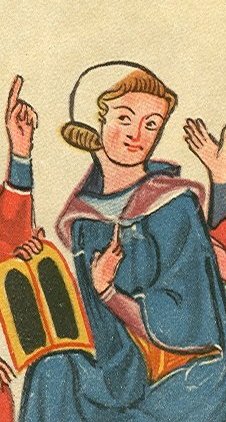

Tintajel
The king, and all his retinue, when this outlandish hunting clamor invaded their premises, were startled and somewhat frightened, more than they would admit, because they never before had heard such a racket in the court. Soon the procession had arrived before the door of the palace. Quite a crowd had gathered there, attracted by the sonorous horns. All of them wondered greatly what all this clangor was. Marke the praiseworthy himself had come to see what this was all about, and with him many a high courtier. When Tristan’s eye fell on the king, he felt at once an attraction to him above the others. Tristan’s heart singled him out, for they were of common blood: nature had drawn his attention. Regarding the king more carefully, he began to compose a greeting. In unusual horn sounds he blew a quite different tune. So loudly did he begin to play 3250 that none of those present would have been able to match it. But this was ended, soon enough.
This exile, so high-born, stopped his playing and fell silent. He bowed to the king with dignity and spoke fine words as well he knew how: “deu sal le roi et sa mehnie, God the good and just preserve the King and all his company!” Marke the noble-spirited and with him his retainers thanked the boy kindly, with all proper regard due a person of high virtue. “Ah!” they exclaimed, as one, the highest and the lowest, “de diun duze aventure si duze creature! God grant sweet venture to so sweet a creature!” The king, regarding the boy more closely, summoned the huntsman to his side. “Tell me,” he said, “who is this child whose words are so polished and chosen?” “My lord, he is a Parmenoise, so marvellously courteous and of such worthiness as I have never known a child. He says his name is Tristan, and his father is a trader. I don’t believe a word of it. How ever could a merchant, so busy with his affairs, have leisure to raise him so? Could one whose very life is business have taken serously such diversions? And, Sire, he is so rarely skilled-- this strange new hunting craft you see that we bring with us back to court-- it was from him we learned it all. And notice what a clever trick-- the stag was carried back to court in the natural order of its parts. Who’d have thought up such a thing? The head, you see, leads the way, and then the brisket, right behind, Shanks and shoulder, so forth and so on. Never was a finer show 3300 spread before the court than this. Now look there! Have you ever seen this “fork” business done before? Not in all my hunting days have I ever heard of such a thing. And that’s not all. He showed us how you ought to break up a stag, correctly. This method seems so fine to me that I’ll never again just quarter a kill, stag or deer or whatever it is, as long as I’m still able to hunt.”
Then he went back to the beginning and started to tell his lord how accomplished he was in courtly hunting customs and how he spread the quarry for the hounds to eat. And as the hunter spoke, the king was listening carefully. Then having commanded the boy to stay, he dismissed the hunt to their quarters, to perform their office and other affairs. They spurred their mounts and rode away. Tristan the young master huntsman handed back his little horn to his senior, and dismounted. The youths of the retinue went to receive the boy and conducted him in style, arm in arm, before the Crown. And well he knew the courtly stride. He also had the stature for it, a presence shaped by love: the mouth, full and red as any rose, bright of countenance, clear of eye, full the hair in brunette ringlets, ending in a curl; well-formed in arms and hands, of graceful shape, and white; not too short, nor too tall, with feet and legs in proportion culminating his symmetry, all in all inviting praise such as men prize in worthy persons. His dress and raiment, as I have told you, were of the finest courtly cut, custom-made to fit him. So well had he learned a fine manner and proud bearing that it was a pleasure to behold him. 3350
| Next Episode | Index of Episodes |